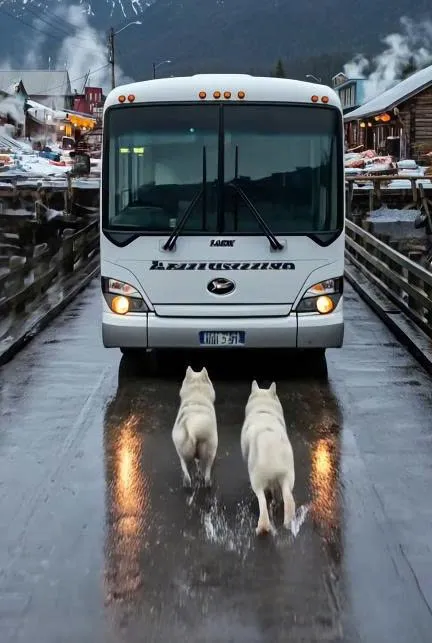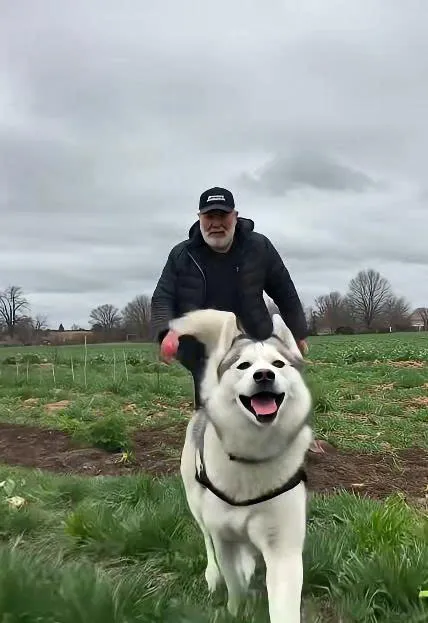The Day a Wolf Asked a Human for Help—And He Answered
Mother Snow Wolf Saves Her Cubs With the Help of an Old Man
In the frozen wilderness, survival is never guaranteed. Blizzards, avalanches, and predators test every creature’s strength and resilience. Yet within this harsh environment, a heartwarming and extraordinary tale unfolded—one that reminds us that the bond between humans and animals can sometimes overcome even the most merciless forces of nature.
This is the story of a mother snow wolf who fought desperately to save her trapped cubs, and the unlikely ally she found in a weathered old man living alone in the mountains.
The Harsh Land of the Snow Wolves
High in the northern ranges where winter never loosens its grip, snow wolves roam in small packs. Known for their sharp instincts and fierce loyalty to family, they endure brutal temperatures and constant threats. For one mother wolf, the ultimate test arrived on a stormy afternoon when disaster struck her den.
A sudden avalanche—triggered by shifting ice on a nearby slope—buried the entrance to her den under heavy snow and ice. Inside, her helpless cubs whimpered, trapped with no way out.
The mother pawed furiously at the icy mound, whining, howling, and digging until her paws bled. But the snow was packed too tightly. Her cries echoed across the mountains, a desperate call for help.
The Old Man in the Cabin
Not far from the slope, in a weathered wooden cabin, lived an old man named Elias. For decades, he had chosen solitude in the mountains after retiring from city life. Known by nearby villagers as a reclusive figure, Elias spent his days chopping wood, tending a small fire, and living quietly with the company of nature.
That day, he heard the haunting sound of a wolf’s howl cutting through the howling wind. At first, he assumed it was the usual cry of hunger or territory. But something in the sound felt different—urgent, broken, almost pleading.
Driven by instinct and curiosity, Elias wrapped himself in a thick fur coat, grabbed his walking stick, and trudged into the storm.
A Desperate Encounter
Following the howls, Elias soon came upon a breathtaking sight: a snow wolf, pacing and digging frantically at a mound of snow, her cries sharp with anguish. At first, Elias hesitated. Wolves, after all, are dangerous predators. But the way she looked at him—ears lowered, eyes wide, tail down—did not seem threatening. It was as if she was begging him to understand.
Then he heard it: faint whimpers from beneath the snow. Cubs.
In that moment, Elias realized the truth. This was not just a wild animal. This was a mother fighting for her children.
The Rescue
Without a second thought, Elias knelt down beside the mound. Using his walking stick and his bare, weathered hands, he began to dig alongside the wolf. Snow and ice numbed his fingers, but he pressed on. The mother wolf continued scratching too, occasionally stopping to glance at him with what felt like gratitude.
Minutes stretched into what felt like hours. Finally, Elias broke through to a small hollow pocket in the snow. Tiny cries grew louder as he cleared more space. One by one, he pulled out shivering cubs—three in total—placing them gently on the snow. The mother immediately nudged them close, licking their fur and whining softly.
The cubs were weak but alive.
The Silent Understanding
For a brief, extraordinary moment, man and wolf stood together in the storm. Elias, gasping for breath, leaned on his stick. The mother wolf, instead of attacking or fleeing, pressed her nose to his hand. Her amber eyes met his, holding a look that needed no words: a silent thank you.
Then, with her cubs huddled against her, she turned and padded back into the wilderness. The snowstorm swallowed her figure until she vanished into the white.
Aftermath: A Story That Spread
When Elias returned to the village days later for supplies, he shared his story. At first, many dismissed it as a tall tale. But his frostbitten hands, torn gloves, and the emotion in his voice silenced skeptics.
Soon, the story spread beyond the small community, capturing the imagination of people worldwide. The image of an old man digging alongside a wolf to save her cubs became a symbol of hope, compassion, and the unspoken bond between humans and the wild.
Why This Story Resonates
-
Universal instinct of parenthood – Whether human or animal, a mother’s fight to save her children is one of the strongest forces in nature.
-
Trust between species – Wolves are naturally cautious, yet this mother allowed a human to come close, understanding he meant no harm.
-
Courage in solitude – Elias could have walked away, but instead he chose to risk himself for lives that weren’t his own.
The Science of Wolf Behavior
Animal experts later commented that wolves, while often feared, are highly intelligent creatures capable of reading body language and intent. In this case, the mother wolf likely sensed Elias’s lack of aggression and recognized his help.
“It’s extremely rare,” noted one wildlife biologist. “But animals sometimes know when they have no choice but to trust. This wolf did—and it saved her cubs.”
The Legacy of the Story
Months later, Elias claimed he sometimes spotted the wolf from a distance, her cubs growing stronger by her side. She never approached the cabin, but occasionally, on quiet nights, he would hear a soft howl echoing near the valley—gentler than the desperate cries of that stormy day.
To him, it felt like a greeting. Or perhaps, a reminder that gratitude in the wild has its own mysterious language.
Conclusion: A Bridge Between Worlds
The tale of the mother snow wolf and the old man is more than a story of survival. It is a testament to the fragile yet profound connections that exist between humans and the natural world.
In a place where life is brutal and mercy is rare, an old man’s compassion and a wolf’s trust created a fleeting bridge between two worlds. And in that moment, when cubs were pulled from the icy grip of death, humanity and wilderness stood side by side—reminding us that sometimes, the fiercest battles are won not with strength, but with empathy.





